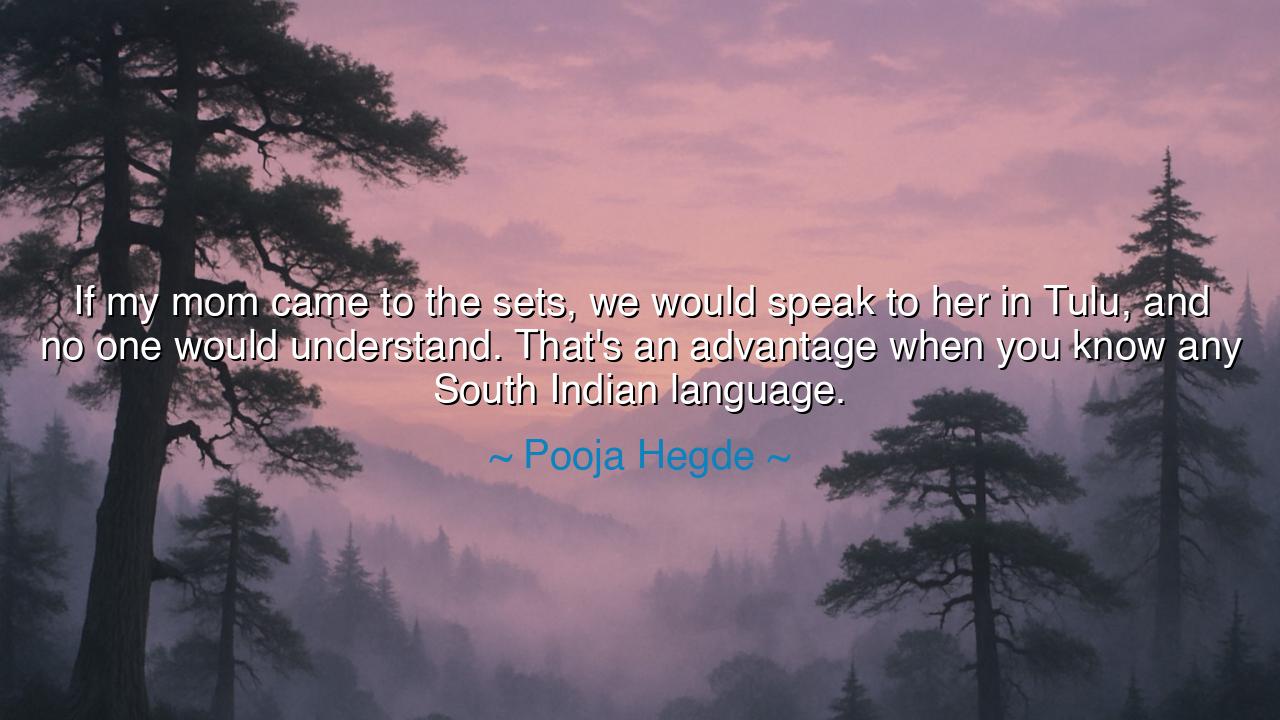
If my mom came to the sets, we would speak to her in Tulu, and no
If my mom came to the sets, we would speak to her in Tulu, and no one would understand. That's an advantage when you know any South Indian language.






The words of Pooja Hegde, “If my mom came to the sets, we would speak to her in Tulu, and no one would understand. That's an advantage when you know any South Indian language,” may at first seem light-hearted, a playful remark about privacy and language. Yet beneath the laughter lies a profound truth — that language is not merely sound or speech, but a vessel of identity, love, and belonging. It is the invisible thread that binds generations together, a living memory of those who came before us, and a quiet power that connects hearts even in foreign lands.
In the world of the ancients, to speak one’s mother tongue was considered sacred. It was not just a means of communication, but a song of the soul — the rhythm of one’s people. To speak it with one’s mother, as Pooja describes, is to return to the hearth, to the warmth of origin, even when surrounded by strangers. For while the world may speak in many tongues, the language of one’s roots holds a music that no translation can capture. It carries the laughter of childhood, the comfort of home, the wisdom of elders — all preserved in syllables shaped by centuries of shared life.
In Pooja’s anecdote, there is also a glimpse of heritage’s quiet power. When she and her mother speak in Tulu amidst others who cannot understand, it is not exclusion, but preservation — a small act of resistance against forgetting. The ancients would have called this anamnesis, the sacred act of remembering who you are. In an age where tongues are traded for convenience, where speech is often shaped by the expectations of others, to speak one’s ancestral language is an act of strength. It is to whisper, “I know where I come from, and I honor it.”
History offers us a poignant example in Ngũgĩ wa Thiong’o, the Kenyan writer who chose to abandon English and write in his native Gikuyu. He was imprisoned for it, yet he declared that language was the spirit of culture, and that to lose one’s tongue was to lose one’s soul. His defiance reminds us of the same truth that glimmers in Pooja’s words: language is identity — not something to be hidden or traded, but cherished and carried proudly, even into the heart of distant worlds.
There is another layer to her statement — one of connection and intimacy. To share a private language with one’s family in a public place is to create a small sanctuary, an invisible home. It is a reminder that love speaks in the words we first learned, that no matter how far we travel, the sound of our mother’s voice in our native tongue roots us once more to the earth of our beginning. The ancients would have likened it to a secret fire — one that can never be extinguished, even when carried into foreign lands.
And yet, Pooja’s reflection carries a gentle humor too — that language can be both shield and bridge. It protects what is intimate, but also teaches humility. For to know more than one tongue is to walk in many worlds at once, to see the richness of humanity in its diversity of sound. It reminds us that wisdom grows not by forgetting where we come from, but by learning to see the sacred in the speech of others. The truly wise person, the ancients would say, does not wield language as a weapon, but as an instrument of harmony.
Thus, the lesson we inherit from Pooja’s words is clear: honor your language, for it honors you. Do not be ashamed of your mother tongue, no matter where you stand. Speak it, teach it, sing it, for every word carries the heartbeat of your ancestors. Let it remind you that identity is not erased by distance, nor by success, nor by fame. And when you speak it with those you love, do so proudly — for in that moment, you keep alive an ancient fire that time itself cannot extinguish.
So, children of the world, remember this: when you speak your language, you speak your story. Let it be your strength, your secret, your song. As Pooja Hegde reminds us with grace and laughter — there is power, beauty, and belonging in every mother tongue. To know it, to use it, to cherish it — that is not just an advantage; it is a blessing older than memory, and a legacy that must never fade.






AAdministratorAdministrator
Welcome, honored guests. Please leave a comment, we will respond soon